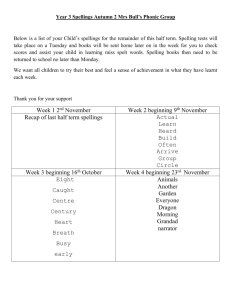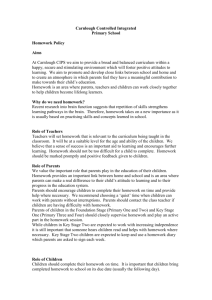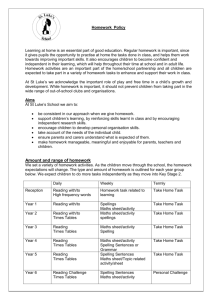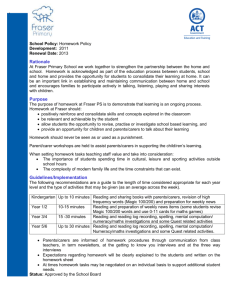Home Learning Policy
advertisement
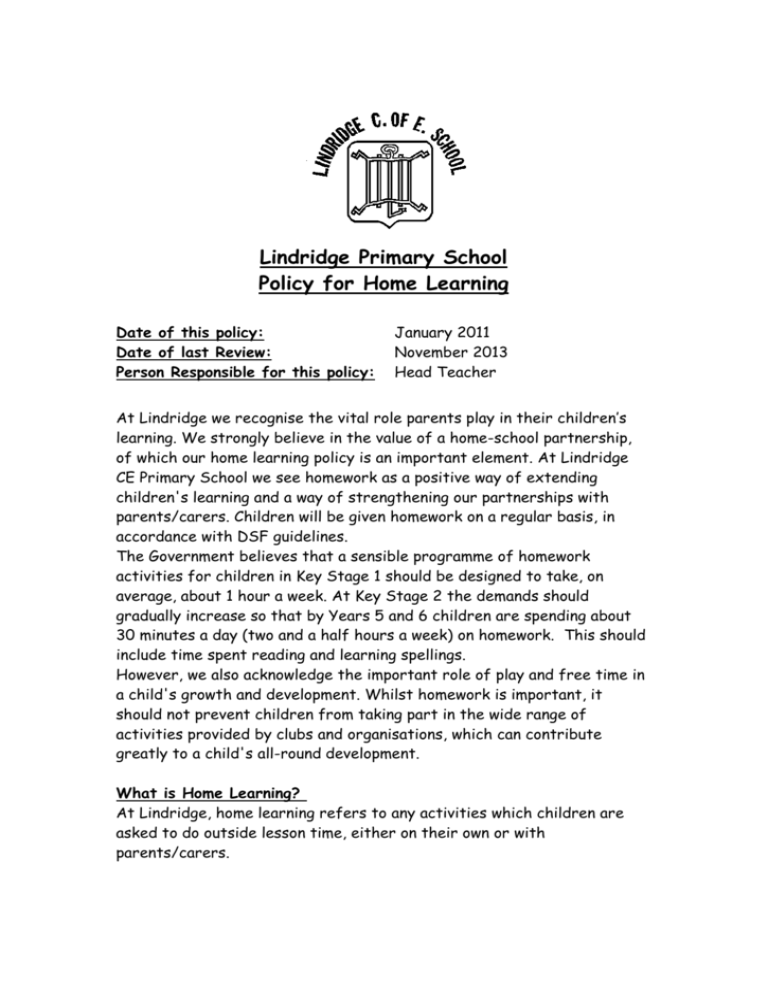
Lindridge Primary School Policy for Home Learning Date of this policy: Date of last Review: Person Responsible for this policy: January 2011 November 2013 Head Teacher At Lindridge we recognise the vital role parents play in their children’s learning. We strongly believe in the value of a home-school partnership, of which our home learning policy is an important element. At Lindridge CE Primary School we see homework as a positive way of extending children's learning and a way of strengthening our partnerships with parents/carers. Children will be given homework on a regular basis, in accordance with DSF guidelines. The Government believes that a sensible programme of homework activities for children in Key Stage 1 should be designed to take, on average, about 1 hour a week. At Key Stage 2 the demands should gradually increase so that by Years 5 and 6 children are spending about 30 minutes a day (two and a half hours a week) on homework. This should include time spent reading and learning spellings. However, we also acknowledge the important role of play and free time in a child's growth and development. Whilst homework is important, it should not prevent children from taking part in the wide range of activities provided by clubs and organisations, which can contribute greatly to a child's all-round development. What is Home Learning? At Lindridge, home learning refers to any activities which children are asked to do outside lesson time, either on their own or with parents/carers. Aims of our Home Learning Policy Through our policy we aim to: provide opportunities for parents/carers, children and school to work in partnership; encourage a positive attitude to work; consolidate and extend learning experiences; improve the quality of learning experiences offered to the children; ensure consistency of approach throughout the school; ensure parents/carers have a clear understanding of our expectations in relation to the children’s learning; ensure progression towards independence and individual responsibility, ultimately preparing Year 6 children for secondary transfer. In ensuring the successful implementation of our Home Learning Policy, we recognise the importance of staff and parents/carers being clear about their role to ensure maximum benefits for the children. Role of Parents/Carers Parents/carers are encouraged to support their child’s home learning through: providing a reasonably peaceful, suitable place in which their child can do their home learning; making it clear to the child that they value home learning; encouraging and praising their child when home learning is completed; sitting with their child and talking about the activities; reading with their child each night Keeping the teacher informed, e.g. if support from a parent was needed, the work was too easy, etc. by annotating the child’s homework or speaking with the teacher. Role of Class Teacher Class Teachers will: ensure home learning is well integrated into their everyday work and planning; ensure the school policy is put into practice; ensure that tasks are carefully planned and structured to support progression and learning; have high expectations of children completing their home learning; provide children with prompt, clear feedback on their work ensure home learning activities match the needs of the children. Role of the child Children will: ensure their homework is done on time; speak to the teacher if they have any problems and ask for help; ensure that their homework is done to the best of their ability; ensure that their homework is well presented and neat. GUIDELINES FOR HOME LEARNING AT LINDRIDGE Reading All children should enjoy reading with an adult/older sibling at home every day. This should involve a range of activities: An adult reading to the child The child reading to an adult Reading games, e.g. with flash cards Talking about the book, asking questions, etc. Children will choose from colour banded reading books and will be given 3 books to read over the week until they are on ‘free reading’ higher up the school, when they are able to read longer, more difficult books. Children should continue to read to adults and hear adults read to them, even when they reach this stage. As children go up the school and become more independent, they will increasingly be expected to change their own books. Spelling The most effective way of learning spellings is to work on them on briefly (5 minutes) on a daily basis, e.g. through games. They might find it helpful to use a strategy like Look, Cover, Write, Check or they might want to write their words into sentences or make up mnemonics. The children will be tested on their spellings weekly at school. This may be done formally on paper or informally on whiteboards. Children will be expected to apply the spelling rules they have learnt to other words with similar spelling patterns in other areas of the curriculum. Early Years - Reception Children in their Reception year will not be given homework for the first few weeks to give them a chance to settle into school first. When the children are ready, they will be given books without words to encourage discussion and a love of books. Books with words, together with word flash cards, will be introduced as appropriate for each child and parents are encouraged to listen to their children read and/or read to their children on a daily basis. The emphasis at this stage is on parents talking to their children, e.g. at the supermarket, commenting on road signs, etc. A home/school/reading diary book is used as a daily method of communication between parent and teacher. An entry should be made every day. Each child’s learning journey goes home on a regular basis and parents should discuss this with their child. Parents may wish to add photographs or comments to the learning journey. Year I In Year 1 children should read on a daily basis for between 5 and 10 minutes. They are also given spellings to learn and are given the occasional Maths challenge. Year 2 In Year 2 children should read on a daily basis for between 5 and 15 minutes. They will also be given a list of spellings to learn and one piece of written homework per week. This may be Maths, English or occasionally topic homework. All homework will be linked to work they are doing at school. Years 3 and 4 In Years 3 and 4 children should read on a daily basis for between 10 and 15 minutes. They will also be given a list of spellings to learn and one piece of other homework to complete each week, usually Numeracy. Occasionally the children will be set other pieces of homework, e.g. of a research nature and related to their current topic. Years 5/6 In Years 5 and 6 children are expected to read every night for at least 15 minutes. In addition to a weekly list of spellings to learn, they will have one piece of Maths homework per week which will be linked to the topic being studied at school. Children will also be asked to work on an extended termly project, which will be more creative in nature. SUPPORT STRATEGIES We know that some children are unable to do homework at home for a variety of domestic reasons. In some cases we suggest that it would be better to do homework at lunchtime because we feel that the child will benefit from our help and support. These children are able to sit in a classroom at lunchtime and do their homework in school. Children who have not done their homework because they forgot are also expected to do it in school. In some cases the problem will need to be discussed with parents.
